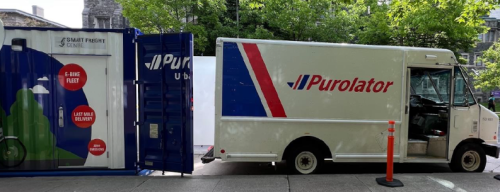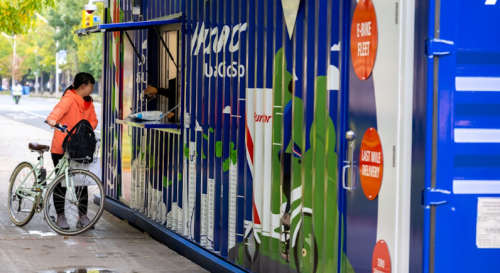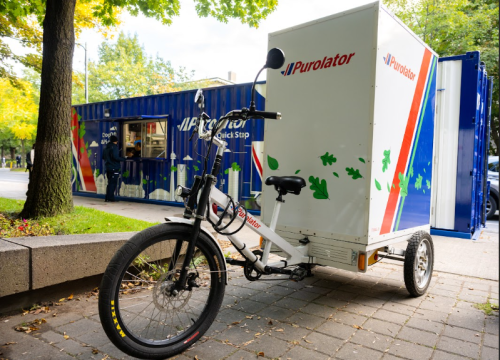
The use of large delivery vehicles in urban areas can result in problems with air pollution, noise pollution, congestion, curbside conflicts, and road safety issues. To address these freight-related issues, the City of Toronto has been supporting courier companies to replace their delivery trucks and vans with electric cargo bikes when conducting last-mile-deliveries in the urban core. One of the ways the City has been facilitating cargo bike use within the freight industry is by allowing for the operation of On-Street Logistics Mini-Hubs (‘Mini-Hubs’).
 An On-Street Logistics Mini-Hub is a small structure located in the right-of-way that is used by a courier company to aid in their last-mile cargo bike operations. Mini-Hubs function as both micro-distribution centers (small scale package storage and sorting facility) and as an overnight storage facility for a courier company’s electric cargo bike fleet. Mini-Hubs may also have additional features and services, such as a walk-up retail store front window.
An On-Street Logistics Mini-Hub is a small structure located in the right-of-way that is used by a courier company to aid in their last-mile cargo bike operations. Mini-Hubs function as both micro-distribution centers (small scale package storage and sorting facility) and as an overnight storage facility for a courier company’s electric cargo bike fleet. Mini-Hubs may also have additional features and services, such as a walk-up retail store front window.
 In partnership with the University of Toronto and Purolator, the City of Toronto piloted Toronto’s first ever On-Street Logistics Mini-Hub for an 18 -month period between autumn 2022 and spring 2024. The pilot was approved by Council on June 15, 2022 and the location was made permanent on June 26, 2024.
In partnership with the University of Toronto and Purolator, the City of Toronto piloted Toronto’s first ever On-Street Logistics Mini-Hub for an 18 -month period between autumn 2022 and spring 2024. The pilot was approved by Council on June 15, 2022 and the location was made permanent on June 26, 2024.
The pilot Mini-Hub is a repurposed, 40-foot shipping container. The structure occupies five former pay-and-display parking spaces within a parking layby on St. George Street, which is situated in the University of Toronto’s downtown campus. There are three primary functions of the St. George Mini-Hub pilot location: it acts as a distribution center for Purolator’s last-mile cargo e-bike delivery operations, it serves as an overnight storage and charging facility for Purolator’s cargo e-bike fleet, and it also provides a full retail storefront window for customers to pick up and drop off packages.
The purpose of the pilot period was to investigate the capabilities of using cargo e-bikes for sustainable last mile deliveries in downtown Toronto. Key goals of the pilot include reducing emissions and congestion, increasing rider and pedestrian safety, and optimizing courier efficiency.
 The operations of the Mini-Hub pilot were monitored by City staff and researchers at the University of Toronto over the 18-month trial period. Research showed that the Mini-Hub pilot location had positive impacts on operational efficiency and air quality.
The operations of the Mini-Hub pilot were monitored by City staff and researchers at the University of Toronto over the 18-month trial period. Research showed that the Mini-Hub pilot location had positive impacts on operational efficiency and air quality.
The Mini-Hub pilot was the recipient of numerous awards including:
In 2024, Toronto City Council announced that Mini-Hubs would be allowed to operate across the city. Mini-Hubs that are located in the right-of-way are regulated by Transportation Services at the City of Toronto. Courier companies who wish to operate a Mini-Hub in the right-of-way can apply by contacting Doolin O’Reilly at Doolin.O’Reilly@toronto.ca.
In order to be approved for a Mini-Hub, courier companies must comply with certain suitability criteria. This criteria is based on lessons learnt from the pilot project and includes (but is not limited to) the following:
Criteria may be amended or added by the General Manager of Transportation Services.
| Description of Fee | Description | Fee Basis | Fee (Annual) |
|---|---|---|---|
| Permit Fee | Installation of an on-street logistics mini-hub | Annual permit per parking space repurposed | $6,657.87 + HST |
| Application Fee | To apply for permission to park an on-street logistics mini-hub | Per application requesting a mini-hub area | $226.93 + HST (non-refundable) |
Courier companies will also be required to pay the Toronto Parking Authority (TPA) a one-time ‘close-off’ cost if the Mini-Hub area permanently removes on-street paid parking spaces. This additional one-time cost is determined by the TPA.
Companies who are operating an On-Street Logistics Mini-Hub:
Additional companies will be added to this tab once they are successful in their application to operate a Mini-Hub in the right of way